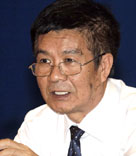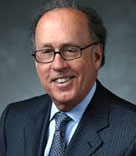The communique shows that the leadership’s policy on the nonpublic sector, especially on the small and medium-sized enterprises, is consistent. This sends a positive signal to private investors. Now the thing is to turn words into action. Although the government had promised to support the private sector, initiatives were not carried out well because of institutional barriers.
|
Editorial:Two points of interest |
As a recent judicial document has called for equal treatment of public and nonpublic sectors, it is likely that other institutional barriers will be broken. The private sector may be allowed to invest in State-owned assets and monopoly industries and to acquire resources on an equal basis as other investors. Such changes will be difficult and gradual, since the central government has to deal with interest groups. But despite the diffi culties, the change is necessary at a time when maintaining employment is crucial. Small and mediumsized enterprises provide more than 85 percent of employment.
The communique does not put forward detailed new measures on anti-graft, and I believe the current measures on anticorruption, such as dispatching inspection teams to government agencies, are going to be continued. The government’s power is not likely to be highly concentrated, as some experts suggested it would be. Instead, the power will continue to be diluted since this is a requirement of modern administration as well as the demand of the people.
The anti-graft authorities might explore more eff ective measures, including asset declarations by government offi cials, under the current framework of power. China has many anti-graft agencies, including the Party’s disciplinary department, the government’s supervision authority and the procuratorate’s anti-graft bureau. The watchdog authorities should be coordinated to make them more eff ective. The government should also move forward in disclosing information and boosting transparency. [More]
The approach to reform seems quite comprehensive, encompassing not just specific areas of economic reform but aiming at changing something as fundamental as the role of the government. Also, this is about the long haul - the leadership hopes to have made good progress by 2020. It will be gradual reform, not rapid changes. The communique confirms that economic reform, more market orientation and further opening-up to the outside world are key pillars of China's economic policy strategy.
|
Editorial:Rural land reform |
On several specific areas of reform, including financial and monetary reform and rebalancing the pattern of growth, the communique says little. That does not mean there is no scope for movement in those areas. The Decisions document is likely to discuss them. Thus, it is too early to say whether the reform directions and orientations agreed at the Plenum will meet the expectations in those closely watched areas.
Other areas that are being closely watched, including State-owned enterprises, urbanization and rural land issues, featured in communique, but with language that does not suggest a major breakthrough any time soon. [More]
1. The senior leadership wants to "deepen overall reforms" including economic, government and judiciary reforms to help establish a modern governance system;
|
Editorial:Bold yet steady reform |
2. SOE reform is not a top priority;
3. The key focuses of economic reforms are on fiscal reform, factor price and market reforms, and social safety net and government administration reforms;
4. Corruption may be contained by reducing the role of the government in allocating resources and giving administrative approvals, and by making consolidated and transparent budgets;
5. Detailed reform plans and progresses will likely be gradual as the leadership aims for "decisive results" by 2020. As highlighted in our earlier reports, reform announcement is one thing, material progress could be another, and the latter is the important one. [More]
The key goal is to clarify the government's role in the economy. These are accompanied by reforms in finance, taxation, State assets, social welfare, land, foreign investment, innovation and good governance. In turn, the reform packages seek to relax control over market access, launch social security and allow sales of collectively owned rural land. The household registration system, which continues to discourage migration, will be phased out beginning with easier access to urban registration in third-tier cities.
The reforms come with increasing financial deregulation. A market-driven financial sector is vital to support the social model and consumption-led growth. Concurrently, China is opening doors for foreign investors and financial institutions, and the intention is to make the renminbi fully convertible and a major international and reserve currency within a decade.
Since early fall, these reforms have been fueled by the creation of Shanghai's free trade zone, along with 18 new policy initiatives, which seek to reduce restrictions in half a dozen key industries, including financial services and telecommunications.
These reforms, which will be spearheaded by a central team, are likely to be phased in over the next decade. [More]
The statement to set up a central leading team for deepening reform is indicative of a strong commitment.
In my hope for China, these are pieces of a bigger puzzle which really shapes the growth model much more towards a balanced economy that draws support not just from export and investment, but increasingly from internal private consumption.
If the economic transformation plays out, the development of Chinese consumption could be one of the most important developments for the world economy too, including the United States.
It's a great opportunity for countries that need new sources of growth, like the United States, to provide both goods and services specifically for Chinese consumers. [More]






 Reform blueprint opens a new era
Reform blueprint opens a new era What to take from the Plenum?
What to take from the Plenum? China wants to "deepen overall reforms"
China wants to "deepen overall reforms" China's reforms amid turmoil in the West
China's reforms amid turmoil in the West
 China's CPC communique encouraging, further details expected
China's CPC communique encouraging, further details expected